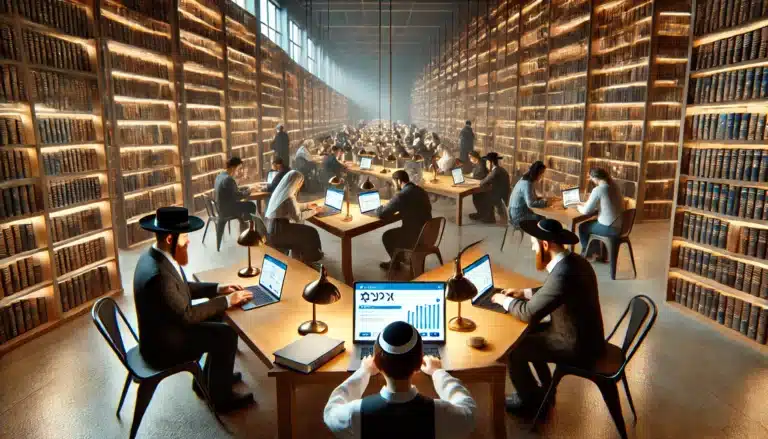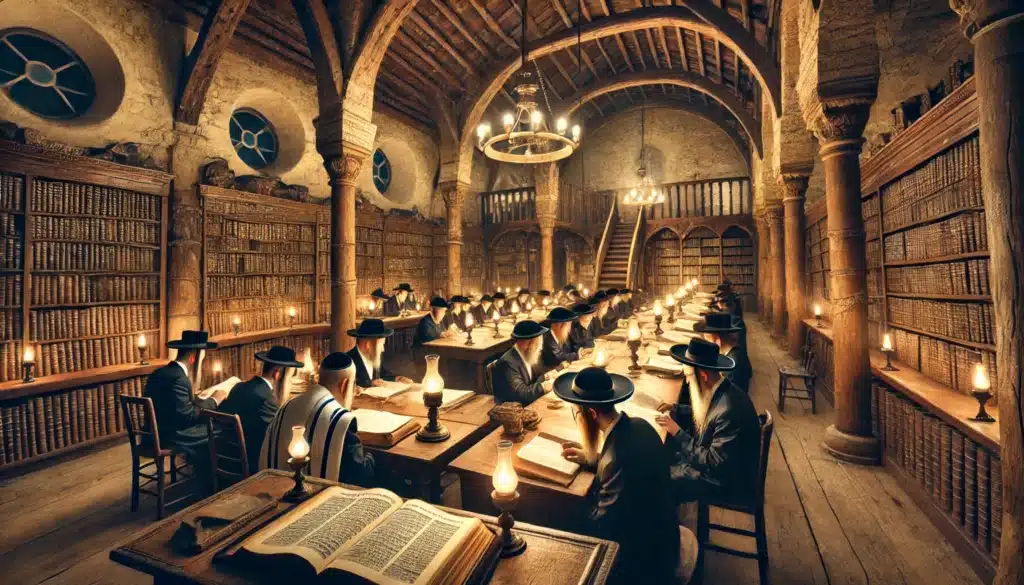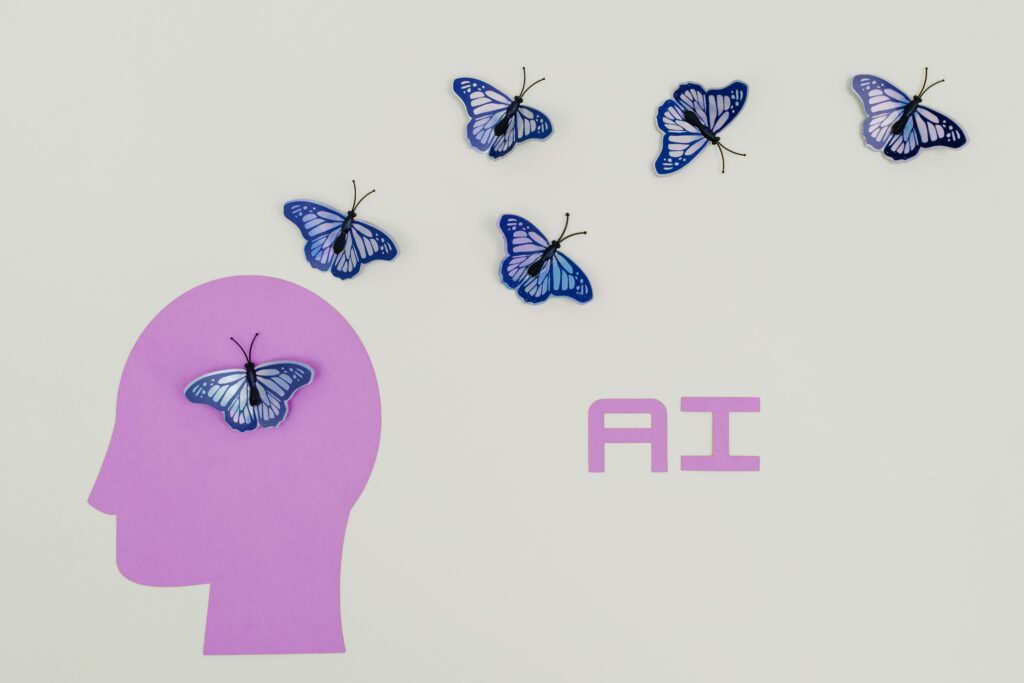
There’s an old saying: Put two Jews in a room and you’ll get three opinions.
It’s a joke, sure, but one that captures a profound truth about Jewish identity. This sacred struggle, this willingness to question even divine authority, isn’t incidental to Jewish identity, it’s fundamental to it. The very name ‘Israel,’ given to Jacob, means “one who struggles with God.” Even Moses repeatedly questioned and debated with God, arguing for mercy after the Israelites began worshipping the golden calf, questioning his own fitness to lead, and challenging divine decisions that might harm the people. That both of Judaism’s greatest prophet were defined by their willingness to wrestle with divine authority tells us something essential about Jewish tradition.
In a world growing increasingly influenced by artificial intelligence, where answers are often just a click away, this heritage of questioning ideas has never been more important.

Questioning in Judaism
Jewish education places questioning at the center of its methodology. From a young age, students are encouraged not just to learn sacred texts and ancient debates, but to challenge them using contemporary contexts. The concept of hevruta, paired learning, is emblematic of this approach. In hevruta study, learning is not passive; it’s an active engagement in which every idea is challenged, and every interpretation is a starting point for deeper exploration.
Maimonides, also known as Rambam, emphasized the need for critical thinking and intellectual engagement with Judaism’s texts. He believed that understanding could only be achieved through rigorous study and questioning. Rabbi Jonathan Sacks, one of the most important thinkers in modern Judaism, spoke about the importance of education as a means of preserving cultural identity and encouraging intellectual exploration. He noted, “Judaism is a religion of questions, not answers.”
The value placed on questioning is embodied in traditions like the Passover Seder, in which we ask,”Why is this night different from all other nights?” This tradition runs deep in Jewish education, shaping not only the curriculum but also the mindset of each learner.
Human wisdom vs. AI answers
AI can provide facts, summarize historical events, or explain philosophical principles, but it cannot wrestle with their implications or explore their moral consequences. Jewish learning, by contrast, is communal and dynamic, driven by debate, emotional wrestling, and the pursuit of deeper meaning, qualities that AI cannot replicate.
Related post: Can an algorithm be Jewish? Meet Robo Rabbi, the AI aiming to do good
Consider the case method of teaching in which students analyze real-life scenarios, debate assumptions, and explore various strategies to understand complex issues. Just like in hevruta study, the goal isn’t necessarily to find the “right” answer but to engage critically and develop nuanced understanding.
In Jewish learning, even incorrect interpretations are valuable because they push the boundaries of understanding. The Beit Midrash, or house of study, is a lively place filled with debate, questioning, and passionate argument in pursuit of wisdom.

Rabbi Abraham Joshua Heschel noted that “each question we ask may give others the ability to ask their own questions and find their own answers.” AI, in contrast, provides static answers without inviting the richness of human interaction.
AI and education
If education is the purpose of society, then we must ask ourselves: What kind of education do we want to provide in the age of AI? The Jewish tradition offers a compelling model, one that values curiosity, debate, and the relentless pursuit of understanding. In this model, students are not passive recipients of information, but rather active participants in discussion. They are encouraged to question the status quo, debate with peers, and challenge even the most sacred text, much as Moses challenged divine decrees not out of rebellion, but out of a deep commitment to justice and truth.
However, the Jewish world has begun delving into AI as Israel has become a global leader in the industry. Different artificial intelligence sites like Rebbe.IO allow Jews to consult an AI “rabbi” to discuss spiritual matters and Talmudic debates. Some rabbis have even begun “training” AI with their sermons to help them with research, editing speeches for tone, or even writing a d’var Torah for clergy members. In these cases, technology becomes not a threat to Jewish intellectual tradition, but a new arena for the age-old practice of sacred struggle.
In some ways, AI might help amplify this tradition of debate. Digital platforms like Sefaria have already transformed how people engage with Jewish texts, making centuries of wisdom more accessible. When used thoughtfully, AI could become a tool for discovering unexpected connections in ancient texts and generating new questions for discussion, not replacing the tradition of debate but providing new partners and arenas for intellectual struggle.
The principles of curiosity and discussion cut across all cultures and are essential to everyone across all fields. The serendipity of discovery, those moments of unexpected insight that arise when exploring a problem from different angles, can only happen when we are willing to engage deeply, challenge our own assumptions, and embrace the complexity of ideas. AI may offer quick and efficient answers, but it lacks the moral courage of Moses or the spiritual persistence of Jacob, in other words, the human qualities that make questioning and wrestling with ideas meaningful.
Even when we look to historians for information, they don’t simply collect facts. They interpret events, debate their significance, and weave narratives that help us understand. The richness of history comes from examining it from countless viewpoints. It is through this multitude of perspectives that we come to a more complete understanding of the past, much as Jewish scholars have approached the Torah and Talmud by debating their meanings and implications.
The Jewish tradition of debate and questioning is not just a relic of the past; it is a vital practice for today. It teaches us that truth is rarely straightforward, that the journey toward understanding is as important as the answers we eventually find. In a world increasingly shaped by easy access to information, we must remember that the role of human intelligence is not simply to receive answers but to ask questions that probe and challenge, to wrestle with difficult ideas until we receive our own blessing of understanding.

How we keep arguing in the age Of AI
As we grow more reliant on AI for information, it’s crucial to remember that Jewish learners continue wrestling with ideas rather than merely accepting them. Truth is not something handed to us neatly wrapped, whether by divine authority or artificial intelligence. It emerges from passionate argument, from the exchange of ideas, and from the courage to engage in sacred struggle.
Put two Jews in a room, and you’ll get three opinions because each question opens the door to deeper understanding. This is how we grow, how we connect, and how we create a better society. Let’s keep asking, and keep challenging, even if it’s over a dinner table filled with laughter, disagreement, and the pursuit of wisdom. In the age of AI, our future depends on our ability to stay human, to question, to doubt, and to never stop learning — to remain, in essence, true to our name as those who wrestle with the greatest questions of our time.
